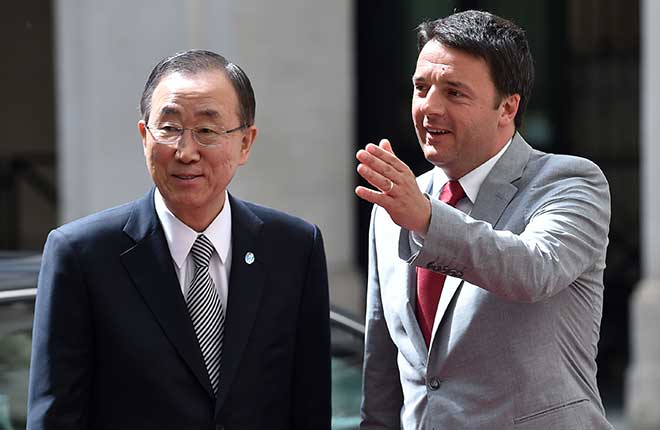They can only apply for asylum in the country where they land. If they leave, they’re sent back. A law that defies the most basic of EU values.
Sixty-five years have passed since 9 May 1950, when France’s then Foreign Minister Robert Schuman laid the foundations of the new European Community with his declaration on the creation of a European Coal and Steel Community.
One of the priorities of the war-torn countries post-WWII was the need to promote development on the African continent – at the time by no means a foregone conclusion. Yet these 65 years seem to have passed in vain, with member states (the UK and France in particular) engaged only in wrapping up the decolonisation era and finding the least traumatic way of absorbing the swelling waves of undocumented immigrants. Famines, unnecessary wars and intensified cultural clashes, along with Western errors and the proliferation of the Islamic State, have done the rest, turning the Straight of Sicily into a flowerless grave for thousands of fleeing migrants.
What is at stake along this narrow stretch of sea – patrolled first with a great sense of duty and professionalism by the Italian Navy after the Lampedusa tragedy of October 2013 through Mare Nostrum and, in recent months, with the less intensive operations of the EU’s Triton mission – is not just the effectiveness of the EU migration policies. Much more is being decided in these waters: the rebirth or demise of the European Union itself, its capacity to attract foreigners based on values it claims to promote and its commitment to the principles of solidarity and civility that the Schuman Declaration enshrined 65 years ago.
Principles that are not always fully comprehended by European heads of state and government, who met in Brussels on 25 and 26 June 2014 to discuss the EU immigration agenda put forward by the Commission, which envisages the redistribution among the 28 EU countries of the large numbers of asylum seekers who’ve recently flowed out of Libya into Italy and Greece.
At the same time, the ‘Dublin wall’ – the Italians’ name for the Dublin Regulation, whose legislation stipulates that a request for asylum must be made in a migrant’s first EU port of call – seems to be wavering with the silent yet determined consent of Germany and despite the wincing of the French and Spanish and the opt-outs for Denmark, the UK and Ireland.
Although fully aware of the difficulties that the problem is creating among public opinion in many countries (often deciding party success and election outcomes), the European Union has not complied with rule number one: expedite, simplify, reassure. The Commission’s offices and the bureaucracies of the member states have seemingly spent most of their energy in dragging the operation out, making procedures more complex and instilling even greater fear in a public opinion already up in arms.
According to the Commission’s draft proposal, the compulsory redistribution of migrants concerns approximately 24,000 Syrian and Eritreans who have reached Italian shores since 15 April and another 16,000 in Greece for a total of 40,000 asylum seekers over the next two years.
In light of the exceptional situation in the Mediterranean, the Dublin Regulation is being called into question for the first time. The Italian police authorities have often disregarded the regulations in recent months, identifying and photo- archiving migrants as soon as they landed on Italian soil and simply letting them move freely towards northern destinations (as proven by the case of the suspected Tunisian terrorist behind the Bardo Museum attack, who was expelled and then returned by sea twice), particularly Germany and Sweden, perhaps even in scenarios straight out of the film On the Bride’s Side.
For the time being, the European relocation plan will only involve Eritreans and Syrians because, in 2014, refugees from the two countries registered an average acceptance rate of asylum requests of over 75% within the EU nations. The European Commission has allocated €240 million – or €6,000 per person – to cover the costs of transferring the 40,000 refugees from Italy and Greece to the other member states.
A further 20,000 asylum seekers are likely to reach Europe from the UNHCR camps in Africa. It will instead take a lot longer for United Nations approval of the resolution to allow the use of force, essential to commencing the Italian-led naval mission off the Libyan coasts meant to neutralise the traffickers and destroy the boats.
These operations have too often been announced and then postponed in recent weeks in a constant dithering that has done nothing but reinforce the trafficking network, which has had all the time it needed to come up with countermeasures. And despite being forced to take part in a photo op organised by Italian Prime Minister Matteo Renzi aboard the San Giusto naval vessel in the Straight of Sicily, this hesitancy is being further compounded by the caution employed by UN Secretary General Ban Ki-Moon even. According to Ki-Moon, there are other ways forward that might stop the traffickers from shipping immigrants to Europe on their rust buckets besides the EU’s military action.
But relying on the UN to resolve an issue that is still perceived as a European immigration emergency has been unwise. The time factor should by no means be underestimated, and if another tragic migrant accident were to take place in the Straight of Sicily, the one to pay would be Renzi. At which point Brussels would not lift a finger to help him.
Sixty-five years have passed since 9 May 1950, when France’s then Foreign Minister Robert Schuman laid the foundations of the new European Community with his declaration on the creation of a European Coal and Steel Community.
One of the priorities of the war-torn countries post-WWII was the need to promote development on the African continent – at the time by no means a foregone conclusion. Yet these 65 years seem to have passed in vain, with member states (the UK and France in particular) engaged only in wrapping up the decolonisation era and finding the least traumatic way of absorbing the swelling waves of undocumented immigrants. Famines, unnecessary wars and intensified cultural clashes, along with Western errors and the proliferation of the Islamic State, have done the rest, turning the Straight of Sicily into a flowerless grave for thousands of fleeing migrants.





